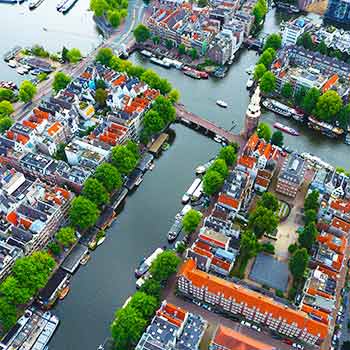Urban Economics and Real Estate- Period 2
STEM in Amsterdam Program
Amsterdam, Netherlands
Dates: 8/17/19 - 12/21/19

Urban Economics and Real Estate- Period 2
OVERVIEW
CEA CAPA Partner Institution: Vrije Universiteit Amsterdam
Location: Amsterdam, Netherlands
Primary Subject Area: Economics
Instruction in: English
Course Code: E_EBE3_UERE
Transcript Source: Partner Institution
Course Details: Level 300
Recommended Semester Credits: 3
Contact Hours: 84
Prerequisites: Introductionary level of microeconomics.
DESCRIPTION
Becasue of technological change (rail, road, air, internet) the cost of connecting across space have declined sharply, which should have made it less attractive for people to cluster together in cities. Yet by many measures, cities are thriving all over the world. Most economic activities such as production, consumption and innovation take place in urban areas, despite the relatively high location costs.
Why is this the case? Why are some cities thriving, while others face serious decline? Why are real estate prices more or less stagnant in some cities or neighborhoods, while they rise sharply in others? Why do firms and households prefer one location of the other? When thinking about location behavior of firms and households, we touch upon various topics that have a substantial impact on real estate markets. For example, the economic backgrounds and consequences of suburbanization, the rise of urban 'subcentres', and the rise of so-called 'network cities', as witnessed worldwide (and in The Netherlands alike). We will also look at interdependencies between cities, in terms of their economic dynamics and functional development.
At the aggregate level, location choices by firms and households translate into (changes in) land use and real estate development in modern cities. In this course you learn, both from a theoretically and empirically perspective, to analyze land prices as a function of, inter alia, population and real estate characteristics, location and transport costs. In addition, we identify the (im)possibilities of influencing the observed trends through urban and real estate policies. What is the impact of imposing or relaxing urban planning regulation on real estate development? Finally, we address some typically urban phenomena in relation to real estate markets: urban environment and green buildings, crime, and local public goods and services such as schooling and parks.
Contact hours listed under a course description may vary due to the combination of lecture-based and independent work required for each course therefore, CEA's recommended credits are based on the ECTS credits assigned by VU Amsterdam. 1 ECTS equals 28 contact hours assigned by VU Amsterdam.
Why is this the case? Why are some cities thriving, while others face serious decline? Why are real estate prices more or less stagnant in some cities or neighborhoods, while they rise sharply in others? Why do firms and households prefer one location of the other? When thinking about location behavior of firms and households, we touch upon various topics that have a substantial impact on real estate markets. For example, the economic backgrounds and consequences of suburbanization, the rise of urban 'subcentres', and the rise of so-called 'network cities', as witnessed worldwide (and in The Netherlands alike). We will also look at interdependencies between cities, in terms of their economic dynamics and functional development.
At the aggregate level, location choices by firms and households translate into (changes in) land use and real estate development in modern cities. In this course you learn, both from a theoretically and empirically perspective, to analyze land prices as a function of, inter alia, population and real estate characteristics, location and transport costs. In addition, we identify the (im)possibilities of influencing the observed trends through urban and real estate policies. What is the impact of imposing or relaxing urban planning regulation on real estate development? Finally, we address some typically urban phenomena in relation to real estate markets: urban environment and green buildings, crime, and local public goods and services such as schooling and parks.
Contact hours listed under a course description may vary due to the combination of lecture-based and independent work required for each course therefore, CEA's recommended credits are based on the ECTS credits assigned by VU Amsterdam. 1 ECTS equals 28 contact hours assigned by VU Amsterdam.










